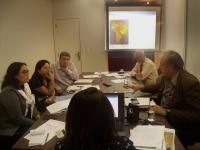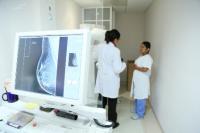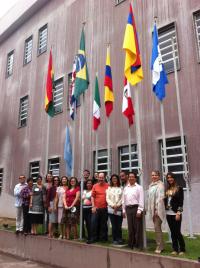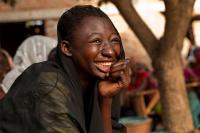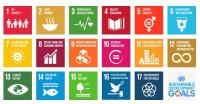You are here
News
-
11/03/2015 - The experience of the European Union with cross-border health care was the subject of the opening conference of the workshop “Border health policies in UNASUR”, organized by ISAGS, from October 27 to 29, in Rio de Janeiro (Brazil). The speech was broadcasted live and was delivered by the expert from European Commission, Maria Iglesia Gomez. Delegations from the 12 countries of the Bloc, besides representatives from sub-regional organisms - CARICOM, ACTO, ORAS-CONHU and MERCOSUR – participated.
-
10/26/2015 - With the purpose of responding to the needs of countries of the Andean area in order to ensure the access to quality and efficient medicines at a low cost, the electronic platform of the Andean Observatory on Medicines was launched in Cochabamba (Bolivia), on October 13. The mechanism was developed by the Executive Secretariat and by the Subregional Technical Commission on Policies for the Access to Medicines of ORAS-CONHU, and received support from PAHO Bolivia, as well as contributions from the Ministries of Health of the region. The strategic points of the Andean policy for medicines outlined the four central axes that constitute the Observatory: the access to medicines; quality, efficiency and safety; the rational use of medicines; research and development.
-
10/19/2015 - The head of the Unit for Health Care Systems of the European Commission’s Directorate General for Health, Maria Iglesia-Gomez, will deliver the opening speech of the workshop “Border Health Policies in UNASUR”, on October 27 (Tuesday), at 10.30 am, at the headquarters of the South American Institute of Government in Health (ISAGS), in Rio de Janeiro. During the event, the expert will talk about the experiences of the European Union with cross-border health care, demonstrating the importance of health in the development of public policies towards regional integration and breaking geopolitical paradigms.
-
10/14/2015 - UNASUR’s Public Health Schools Network (RESP) held a workshop on October 6-8 in Ecuador to discuss and develop quality criteria and minimum common curricula in public health for mid-level (technical) and undergraduate level in South America. The meeting included representatives from ten countries of UNASUR (Brazil, Chile, Colombia, Ecuador, Guyana, Paraguay, Peru, Suriname, Uruguay and Venezuela), as well as members of the South American Institute of Government in Health (ISAGS), the Center for International Relations in Health (CRIS/Fiocruz) and UNASUR Health Technical Schools Network (RETS-UNASUR), one of the two subnetworks of the International Network of Health Technicians Education (RETS).
-
10/13/2015 - Experts from international organisms and members of ISAGS concluded on 14 August, the preparatory meeting for the workshop "Border health policies in UNASUR”. The event will be held on October 27, 28 and 29 at the headquarters of the Institute in Rio de Janeiro, and its objective is to outline an international, subregional and intersectoral overview of health care in border areas through an exchange of experiences. The aim is to understand the political, economic and social mechanisms at national and local levels in order to point out challenges and formulate recommendations.
-
10/13/2015 - Early detection and treatment of breast cancer can save the lives of thousands of women in the Americas, experts from the Pan American Health Organization/World Health Organization (PAHO/WHO) stressed at the start of Breast Cancer Awareness Month, an annual international health campaign by major breast cancer organizations to increase awareness of the disease. "Breast cancer can be detected early and treated effectively," said Silvana Luciani, PAHO/WHO regional advisor on cancer prevention and control. "The challenge is to provide equal access to quality screening and treatment services, especially in areas where resources are limited."
-
10/08/2015 - The second meeting of the International Multicenter Study coordinated by the International Network of Health Technicians Education (RETS) takes place on October 20 at the Joaquim Venâncio Health Polytechnic School (EPSJV/Fiocruz). This stage will gather EPSJV researchers and include study evaluation and design in Brazil. The research aims to identify and analyze quantitative and qualitative provision of health technical education in different countries. The proposed action has similar methodology to the Mercosur Project and is one of the items that make up the RETS Work Plan approved in November 2013, during the 3rd General Meeting of the Network.
-
10/07/2015 - Two United Nations agencies – the UN World Health Organization (WHO) and the Joint UN Programme on HIV/AIDS (UNAIDS) – announced they have developed new standards for quality health-care services for adolescents, which aim to help countries improve services for people between the ages of 10 and 19. “These standards provide simple yet powerful steps that countries – both rich and poor – can immediately take to improve the health and wellbeing of their adolescents,” said Dr. Anthony Costello, Director of Maternal, Children’s and Adolescents’ Health at WHO, in apress release.
-
10/02/2015 - At the United Nations Sustainable Development Summit on 25 September 2015, world leaders adopted the 2030 Agenda for Sustainable Development, which includes a set of 17 Sustainable Development Goals (SDGs) to end poverty, fight inequality and injustice, and tackle climate change by 2030.
-
10/01/2015 - The RETS Magazine reaffirms its desire to disseminate experience reports. Therefore, we are accepting articles in the area of technical workers´ education, to be published this year. The idea is to promote the greatest possible number of experience reports, in all areas and levels of education, from those targeting auxiliary workers and health care agents to those related to mid-level technicians and/or higher level technologists.





